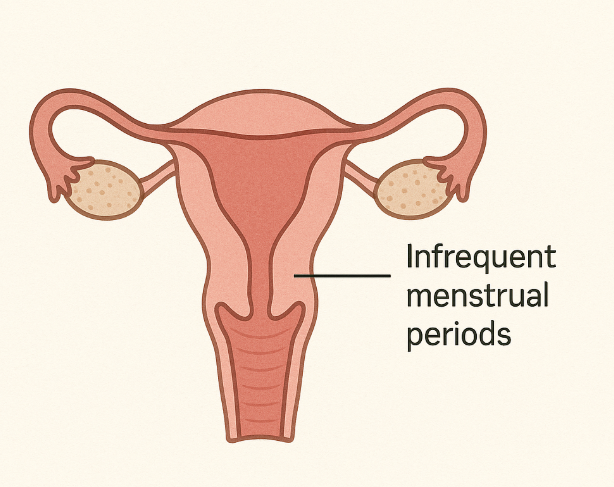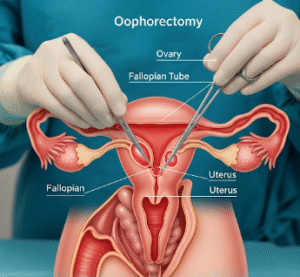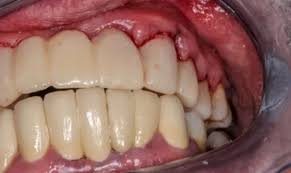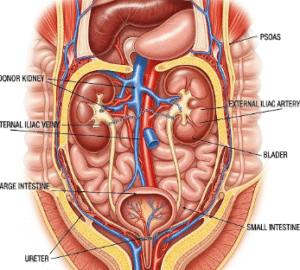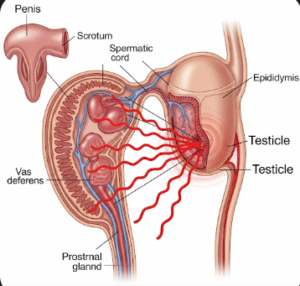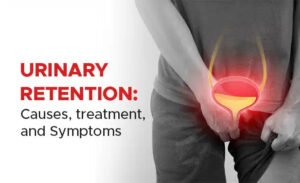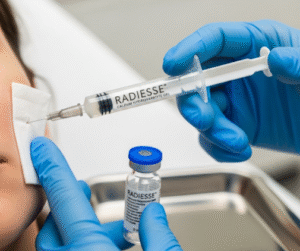Overview
Oligomenorrhea refers to infrequent or irregular menstrual periods, typically defined as menstrual cycles that occur more than 35 days apart. It is a common menstrual disorder and can be a symptom of underlying hormonal imbalances, lifestyle factors, or medical conditions. While it may not always signal a serious problem, persistent or chronic oligomenorrhea can affect fertility and may require medical evaluation and treatment.
What is Oligomenorrhea?
Oligomenorrhea is a menstrual irregularity where a woman has fewer than six to eight menstrual periods per year, or cycles that last more than 35 days. It is more common during adolescence and approaching menopause but can occur at any reproductive age. Oligomenorrhea is often a symptom rather than a disease itself, and it can be linked to hormonal disturbances, excessive physical activity, low body weight, or polycystic ovary syndrome (PCOS).
Symptoms
The primary symptom of oligomenorrhea is infrequent menstrual periods, but depending on the underlying cause, additional symptoms may include:
- Very light menstrual flow
- Skipped periods for several months
- Acne or oily skin
- Excess facial or body hair (hirsutism)
- Hair thinning or scalp hair loss
- Weight gain or difficulty losing weight
- Difficulty getting pregnant
Causes
Oligomenorrhea may result from a variety of causes, including:
- Hormonal imbalances, particularly involving estrogen and progesterone
- Polycystic ovary syndrome (PCOS)
- Thyroid disorders (hypothyroidism or hyperthyroidism)
- High levels of prolactin (hyperprolactinemia)
- Eating disorders or very low body weight
- Intense physical training or stress
- Perimenopause or adolescence (normal in these life stages)
- Certain medications, such as hormonal contraceptives or antipsychotics
Risk Factors
You may be more likely to develop oligomenorrhea if you:
- Have a family history of menstrual irregularities
- Are an athlete or perform intense physical training
- Have low body fat or follow restrictive diets
- Have been diagnosed with PCOS or other endocrine disorders
- Are under chronic stress
- Have recently begun menstruating or are nearing menopause
Complications
Although not always harmful, oligomenorrhea can lead to several potential complications, especially if it persists:
- Infertility or difficulty conceiving
- Osteoporosis due to low estrogen levels
- Endometrial hyperplasia if periods are too infrequent
- Mood swings, fatigue, or emotional distress
- Unpredictable bleeding patterns
Prevention
While not all cases of oligomenorrhea can be prevented, the following steps may help regulate menstrual cycles:
- Maintain a healthy and stable body weight
- Eat a balanced, nutrient-rich diet
- Avoid excessive physical or emotional stress
- Practice regular, moderate exercise
- Avoid disordered eating or extreme dieting
- Seek medical help for thyroid, pituitary, or hormonal symptoms
- Keep a menstrual diary to track changes
Treatment Options in Korea
South Korea provides excellent gynecological and endocrine care, offering thorough evaluation and advanced treatment options for oligomenorrhea. Treatment is based on the underlying cause and may include:
- Hormonal therapy: Birth control pills or hormonal regulators to restore cycle regularity
- Management of PCOS: Lifestyle modifications, weight management, and medications such as metformin or anti-androgens
- Thyroid treatment: Medications to correct hypo- or hyperthyroidism
- Prolactinoma management: Dopamine agonists to reduce prolactin levels
- Fertility treatments: For those trying to conceive, ovulation induction therapy may be recommended
- Nutritional and psychological support: For cases linked to eating disorders or chronic stress
Hospitals in Korea such as Yonsei Severance Hospital, Samsung Medical Center, and Seoul National University Hospital offer comprehensive reproductive endocrinology services with multilingual staff and internationally trained specialists, making Korea a top destination for women seeking menstrual and hormonal care.

